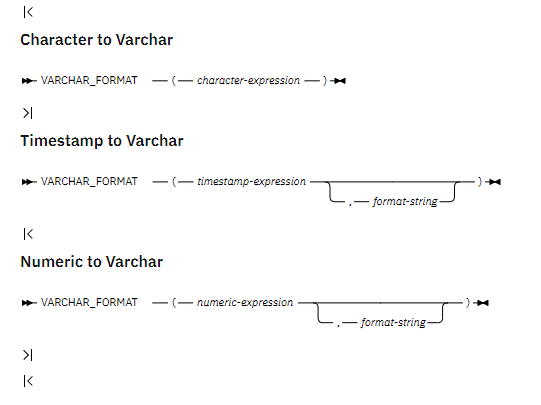SQL Date to Character Conversion
Using TO_CHAR to convert date to character.

The VARCHAR_FORMAT function returns a character string representation of the first argument in the format indicated by the optional format-string. Alternately, the function TO_CHAR is synonymous with VARCHAR_FORMAT.

Convert to Character Function
. . . SELECT ITEMNO, TO_CHAR(LASTMNT, 'DD-Mon-YYYY') FROM ITMMST . . . D DateChar S 10A D DtTmStamp S z inz(*SYS) EXEC SQL set :DateChar = TO_CHAR(:DtTmStamp, 'MM-DD-YYYY') ; . . . SELECT VARCHAR_FORMAT(RECEIVED,'YYYY-MM-DD HH24:MI:SS') INTO :TVAR FROM CORPDATA.IN_TRAY WHERE SOURCE = 'CHAAS' . . . Function invocation Result ------------------- ------ VARCHAR_FORMAT(TMSTAMP,'YYYYMMDDHHMISSFF3') 20070309020738123 VARCHAR_FORMAT(TMSTAMP,'YYYYMMDDHH24MISS') 20070309140738 VARCHAR_FORMAT(TMSTAMP,'YYYYMMDDHHMI') 200703090207 VARCHAR_FORMAT(TMSTAMP,'DD/MM/YY') 09/03/07 VARCHAR_FORMAT(TMSTAMP,'MM-DD-YYYY') 03-09-2007 VARCHAR_FORMAT(TMSTAMP,'J') 2454169 VARCHAR_FORMAT(TMSTAMP,'Q') 1 VARCHAR_FORMAT(TMSTAMP,'W') 2 VARCHAR_FORMAT(TMSTAMP,'IW') 10 VARCHAR_FORMAT(TMSTAMP,'WW') 10
The result is a representation of timestamp-expression in the format specified by the format-string. The format-string is interpreted as a series of individual elements that can be separated by one or more specific characters. A string of characters in format-string is interpreted as the length of the format element that matches an element in the timestamp-expression. If two format elements are composed of the same character and they are not separated by a separator character, the specification is interpreted, starting from the left, as the length of thet element that matches an element from the source, and continues until matches are found for the remainder of the format string. For example, DDYYYY would be interpreted as DD followed by YYYY, rather than D followed by DY, followed by YYY. For a complete list of format values, check IBM documentation.